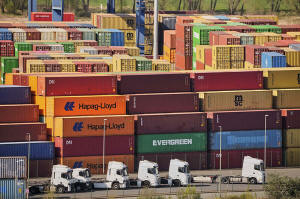Reeling from Trump rebukes, Europe weighs deeper ties with China
[June 27, 2025] By
DIDI TANG and SAM McNEIL
BARCELONA, Spain (AP) — Jilted, betrayed, dumped, or defiant. It's hard
to describe the European Union after relentless attacks from its
once-dependable ally, the United States. The threat from Donald Trump's
second administration against Greenland, its sweeping tariff plans and
courtship of Moscow have firmed up some European leaders’ vows to reduce
their reliance on America.
That has not gone unnoticed in another global power. China hopes for a
Europe detached from the U.S. and is sensing an opportunity now to
divide the West. For the past several years, the EU moved in lockstep
with Washington to levy tariffs on Chinese electric vehicles and
sanction Chinese officials accused of rights violations.
Now, locked in a trade war with Washington that may be prolonged,
Beijing sees the 27-nation bloc as a desirable partner in blunting the
impact from Trump’s tariffs and to maintain its strong global position.
But for EU leaders, meeting Thursday in Brussels to discuss China among
a host of regional and global issues, managing ties with Beijing is no
easy matter.
An upcoming summit in China in July to mark 50 years of ties might offer
the first hint of new consensus between these two global behemoths.
Europe's hopes for China
The EU-China economic ties are hefty: bilateral trade is estimated at
2.3 billion euros ($2.7 billion) per day.
China is the EU’s second largest trading partner in goods, after the
United States. Both China and the EU believe it is in their interest to
keep their trade ties stable for the sake of the global economy, and
they share certain climate goals.

Like the U.S., Europe runs a massive trade deficit with China: around
300 billion euros last year. It relies heavily on China for critical
minerals, which are also used to make magnets used in cars and
appliances. As European companies are seeing declining profitability in
China, Brussels is hoping Beijing will follow through on recent pledges,
like one announced Thursday by the Ministry of Commerce, to ease
restrictions on foreign business ventures.
“While other opened their market, China focused undercutting
intellectual property protections, massive subsidies with the aim to
dominate global manufacturing and supply chains,” said EU Commission
President Ursula von der Leyen at the G7 meeting in Canada. “This is not
market competition – it is distortion with intent."
Now, Europe, already fretting over the trade deficit, worries that
Trump's tariffs could divert even more Chinese goods to Europe,
destabilizing markets across the continent.
Such vulnerabilities could strengthen Beijing's negotiating position,
said Alicia Garcia-Herrero, a China analyst with the Brussels-based
Bruegel think tank.
“China has built so many strategic dependencies that the EU is trapped
in an asymmetric relationship,” she said, and Beijing could leverage
them to “get a deal in July" at the summit.
Beijing's new strategy for Europe
Analysts don’t expect a grand bargain at the summit, but China will
likely demand the EU lift tariffs on Chinese electric vehicles or even
reopen the bilateral trade treaty, the Comprehensive Agreement on
Investment. Either or both would send a powerful signal to Washington.
But China's main goal is ensuring the EU remains an accessible and
affluent market for goods that might not reach the U.S. because of
Trump’s tariff blitzkrieg. Despite a truce in the trade war, Chinese
businesses are widening their global reach to be less dependent on the
U.S.
Regardless of any deal, the summit itself will be the message, said Noah
Barkin, an analyst of Europe-China relations at the German Marshall Fund
think tank. For the EU, the main goal would be for von der Leyen to meet
Chinese President Xi Jinping, he said.
Whereas she was “treated rather shabbily” on a 2023 trip to Beijing,
Barkin said the Chinese this time will probably “roll out the red
carpet," keen to see “pictures of Chinese and European leaders walking
through gardens and sending a message of unity.”

[to top of second column] |

Containers are stored at a container terminal in Duisburg, Germany,
the day after President Trump announced new tariffs for the EU and
the rest of the world, Thursday, April 3, 2025. (AP Photo/Martin
Meissner, File)
 Sun Chenghao, head of the U.S.-EU
program at Tsinghua University’s Center for International Security
and Strategy, expressed hope “that the future of China-Europe
relations can be more independent on both sides.”
“For Europe, that would mean shaping its China policy based on its
own interests, rather than simply taking sides,” Sun told the German
Marshall Fund in a podcast. “And for China, this means building a
more independent and nuanced approach to Europe.”
“It is precisely because most European decision-makers realize the
necessity of strategic autonomy that they have made it clear that
they must strengthen cooperation with China," said Yan Xuetong, dean
of the Institute of International Relations at Tsinghua University,
to The Paper, a Shanghai-based news site.
"Even if China and Europe have differences on the Ukraine issue,
there is still room for expanding cooperation in areas beyond the
differences.”
Obstacles in EU-China ties
China’s deepening ties with its historic allies in Europe like
Hungary and Greece stand alongside fears across the continent about
its human rights record, espionage, trade policies, military buildup
and support for Russia.
European police arrested employees of the Chinese tech giant Huawei
during an ongoing bribery investigation in Brussels. Czech
intelligence services have claimed Beijing directed cyberattacks on
its critical infrastructure. And the EU’s criticisms of China’s
human rights violations remain unabated.
Russia’s invasion of Ukraine has further disaffected Europe from
China. Despite Beijing’s claims of neutrality, Europe largely sees
China as complicit in, if not covertly supporting Russia’s war
machine.
The EU recently cancelled a high-level economic and trade dialogue
with China, due to a lack of progress on trade disputes. It also has
moved to restrict Chinese participation in EU medical devices
procurement.
U.S. warns Europe not to get closer to China
U.S. Treasury Secretary Scott Bessent has called out Spain for its
courtship of China, warning that countries seeking to get closer to
China would be “cutting their own throat” because Chinese factories
will be looking to dump goods that they can’t ship to the U.S.

By decoupling their positions on China, analysts say both Brussels
and Washington have weaker hands dealing with Beijing. And that
might hurt the U.S., which has vowed to prevail over China and
retain its global dominance but, as many believe, needs help from
its allies and partners.
“If we could just get Japan and the EU and the U.S. together on any
issue, ... we could outweigh the Chinese at the negotiating table,”
said Nick Burns, the U.S. ambassador to China in the Biden
administration. “President Trump, I think, because of his
inattention to our allies and maybe even worse, his sometimes just
acrimonious behaviors towards allies, has given away that leverage.”
Joerg Wuttke, former president of the EU Chamber of Commerce in
China and now a partner at DGA-Albright Stonebridge Group in
Washington, argued that the fundamentals underlining EU-China
relations have not changed as long as China does not take genuine
steps to open its market and that the EU remains “geared towards”
the U.S., though he described Washington as a “major backdrop
noise.”
“We are not allies. We are trading partners,” Wuttke said of EU and
China. “And, so from my point of view is, what is there to worry for
the United States?”
___
Didi Tang reported from Washington.
All contents © copyright 2025 Associated Press. All rights reserved |